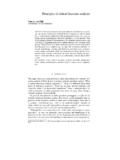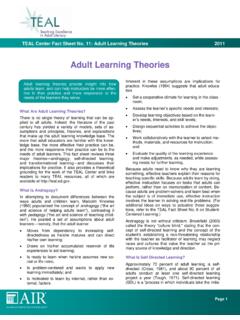Transcription of Constructivism in the Classroom - ed
1 William J. Matthews51 Teacher Education Quarterly, Summer 2003 Over the previous two decades the emergence of post-modernist thought ( ,radical Constructivism , social Constructivism , deconstructivsm, post-structuralism,and the like) on the American intellectual landscape has presented a number ofchallenges to various fields of intellectual endeavor ( , literature, natural science,and social science) (Matthews, 1998; in press). Nowhere is this challenge moreevident and therefore more problematic than in the application of post-modernism(in the form of constructivist teaching) to the Classroom . Employing constructivistteaching practices is problematic at two levels: (1) there is an absence of empiricalevidence of effectiveness; and (2) employing this approach for which there is a lackof evidential support, means not employing instructional practices for which thereis empirical support. The purpose of this article is topresent an overview and critique of constructivistteaching practices, followed by a brief review ofevidenced-based practices in is Constructivism ?
2 There are numerous variations and definitions ofpost-modernist thought of which Constructivism is aConstructivismin the Classroom :Epistemology, History,and Empirical EvidenceBy William J. MatthewsWilliam J. Matthews is aprofessor in the SchoolPsychology Program ofthe School of Educationat the University ofMassachusetts, Amherst, in the Classroom52subset ( , radical Constructivism , social Constructivism , and deconstructivism).With regard to educational practice, the theoretical perspective of Jean Piaget hashad a significant influence. However, Piagetian Constructivism is a subset of a largerhistorical challenge to modernist notions of objective reality in general and the useof empirically validated methods of teaching specifically. Much of Americanpostmodernist/constructivist thought can be traced to the French philosophers,Jacques Derrida and Michael Foucault, whose views achieved prominence during thesocial upheaval in late 1960s France (Gross & Levitt, 1994).
3 Derrida founded the deconstrucivist school of textual analysis. At its root,deconstructivism holds that true linguistic meaning is not possible. According toDerrida ( Derrida,1992), the notion that language in any way copies or reflectsreality is simply false. There is no reality independent of text and text itself iswithout stability. Foucault, a philosopher of history, and like Derrida, was con-cerned about the problem of language and its attempt to construct reality. Foucaultcontended that social authority and power is itself created through language. Assuch, all human thought is trapped by the language in which it is encased ( ,1973). Interestingly, Foucault came to this view after carefully examiningthe facts of social history the implication being that there are facts to be observedin social history. While there are variations, post-modernist/constructivist thoughtargues that reality is: (1) socially constructed; (2) constituted only through lan-guage; and (3) organized and maintained through narrative (Anderson & Goolishian,1988; Freedman & Coombs, 1996; Gergen, 1985, 1991; Kvale, 1992).
4 In its essence, Constructivism (a subset of post-modernist thought) contends there are no essentialtruths, and no objective reality (Gross & Levitt, 1994; Matthews, 1998).The Problem of ConstructivismWhether stated explicitly, or as more often the case, implicitly, the implicationsof an epistemological view that contends there is no objective reality has a profoundeffect on how the process or education in the Classroom is approached. An importantand necessary question in the educational process must be, How does one establishand evaluate knowledge? In order to answer this question, we inherently assumethat: (1) there is some correspondence between language and reality; (2) ourpropositions about our observations are logically coherent; and (3) there is a reliableand systematic method of testing our observations. If there is no reality other thanthat constructed by language and our narrative lacks internal coherence then the twocriteria for verifying any observation have been eliminated and one is left with arelativistic relativism makes no distinction between objective ( , verifiable) knowl-edge ( , astronomy) and superstition ( , astrology).
5 As such, the merits of agiven perspective are resolved through discourse (the methods of science being oneform of discourse) within a particular community ( , the scientific or astrological)William J. Matthews53(Gross & Levitt, 1994). In the absence of a verifiable reality not only are the tenetsof science reduced to a relativistic narrative, so is, for example, history. The anti-realism of Constructivism allows for historical revisionism independent of verifi-able historical data (since such data are merely constructed). Thus, for example, theheinousness of American slavery becomes only one of many narratives deservingno more legitimacy than other possible narratives ( , that of the slaveholder).There are no reasoning individuals who view slavery as anything but inhumaneand brutal. With regards to American slavery, in order to make the argument of itshorror, one must refer to the verifiable historical record. However, in so doing oneassumes a correspondence between language and reality and that the historical textis determinant ( , contains an internal logical coherence).
6 To argue otherwiseplaces one in the untenable position of denying the historical record. How didconstructivist thinking emerge in educational practice? Prior to considering theimplications for constructivist notions in educational practice, let us consider thehistorical and epistemological context for much of today s constructivist Historical Influence of DevelopmentalismAs stated earlier, Constructivism as applied to education is a relatively recentphenomenon primarily derived from the work of Swiss developmental psycholo-gist Jean Piaget (1973) and Russian psychologist Lev Vigotsky (1978). However,its underlying principles have had a long history in American education influencedby the deveolpmentalist notions of 18th century French philosopher JacquesRousseau, and later, the theories of John Dewey, G. Stanley Hall, and Arnold Gesell(Stone, 1996). Developmentalist teaching practices emerged as a reaction againstthe harsh educational practices employed in 18th and 19th century Europe andAmerica.
7 Understandably, few would describe the Puritan approach to education ofchildren in the American colonies as particularly its broadest conceptualization, developmentalism is a philosophical viewthat holds the individual s social, emotional, and cognitive development is the resultof a progression of natural tendencies which have occurred as a result of naturalselection and evolution. Developmentalist educational practice assumes: (1) hu-mans have a natural proclivity for learning which is the result of the Darwinianprocess of natural selection; (2) there is a specific danger of interfering with thesenatural tendencies, the result being that; (3) learning experiences should emulatethose believed to occur American education, few have had a greater presence or a continuing effectthan John Dewey. For Dewey, since evolution had provided humans with certainnaturally occurring characteristics evolved to fit certain naturally occurring con-texts, teaching was a matter of providing the context for the child in which his orher naturally occurring characteristics could be optimized for the child s stated, Since growth is the characteristic of life, education is all one withConstructivism in the Classroom54growing; it has no end beyond itself.
8 The criterion of the value of school educationis the extent in which it creates a desire for continued growth and supplies means formaking the desire effective in fact (cited in Stone, 1996, ). Dewey held that sincethe educational process was by definition, a function of naturally occurring develop-mental processes unique to a give child, the child s educational development had toemerge from the child rather than from an external agent ( , teacher) (Stone, 1996).Without question, Dewey was a major force for progressive education in theUnited States. While his developmentalist theory was based more on common senseand anecdotes than empirical research, he provided the philosophical impetus for theneodevelopmentalists who followed, such as Jean Piaget, Lev Vigotsky, Carl Rogers,and Abraham Maslow, to name but a few. While each of these individuals had theirown perspective on human development, they shared a common belief with Dewey sprogressive approach to education, the purpose of which, in regards to education, isto facilitate the naturally developing tendencies and potential of the considering the key research findings of the developmental research ofErikson (1963), Piaget (1973) and, Vigotsky (1978), one typically finds a stage-based theory which suggests that children exhibit different interests, as one wouldexpect, at different stages.
9 Thus, during infancy the predominant activity involvesemotional contact, at age two the child is involved in object manipulation, from agesthree to seven years role playing develops, and from age seven to eleven yearsformal study in school occurs. Of course, in each of these theories, developmentcontinues through later findings of developmental research have been directly translated intoeducational ( , instructional) practice. Developmentalist practice can be found in child-centered, progressive teaching practices in Canadian schools, progres-sivism or Plowdenism in the British schools (Stone, 1996), and developmentallyappropriate practice advocated by early childhood educators ( , Carta, Schwartz,Atwater, & McConnell, 1991, cited in Stone, 1996). Learner-centered teachereducation and discovery learning, common to many colleges of education, are yetother examples of developmentalist practice as are the principles common toconstructivist teacher education ( , authentic learning, hands on learning, con-text-based learning).
10 Important to note for the present discussion is that while wholelanguage and literacy emergent approaches to reading are not explicitly develop-mentalist, they do share similar perspectives in that these approaches to languageliteracy emphasize a natural, child-centered approach in learning to practice suggests not only that an interventionist approachto a child s education would be ineffective but is likely to cause harm. Both theNational Education Association and the National Association for the Education ofYoung Children are quite clear that the process of education is not only moreimportant than performance but that to emphasize performance may be damagingto a life long learner (cited in Stone, 1996). The implications of developmentalismhave given rise to a seeming reluctance on the part of many teachers and parents toWilliam J. Matthews55take direct responsibility for influencing the child s learning and educationaldevelopment.











